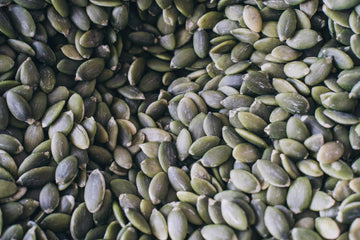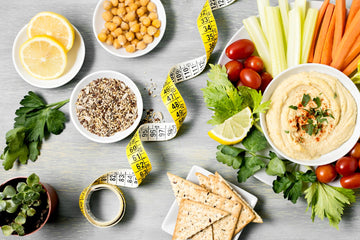Magnesium is one of the most important minerals for our body: It contributes to the normal function of muscles and nerves, supports energy metabolism, and ensures strong bones and increased performance in everyday life. However, magnesium deficiency is not uncommon in Western countries, often because magnesium-rich foods are too rarely included in the diet.
Which foods contain the most magnesium? How can you meet your daily magnesium needs with a conscious choice? Learn everything you need to know here, including practical tips and a clear table.
Why is magnesium so important?
Magnesium is involved in over 300 metabolic processes. The mineral primarily supports:
- Muscle regeneration and function: Magnesium ensures smooth muscle contraction and relaxation. This is especially important for physically active individuals, as a deficiency can lead to muscle cramps or tension.
- Strong nervous system: This mineral stabilizes the transmission of stimuli and has a calming effect on the nervous system. It thus contributes to mental balance, concentration, and improved stress resistance.
- Healthy bones and teeth: Together with calcium and vitamin D, magnesium plays a crucial role in maintaining strong bone structures.
- Energy production: Without magnesium, ATP-dependent processes do not function, i.e. the very mechanisms that supply our cells with energy.
- Electrolyte balance: Especially during strenuous physical activity or in summer (due to increased sweating), a sufficient magnesium intake is crucial for the balance of electrolytes in the body.
The need increases in certain phases of life and during periods of stress: pregnant women, athletes, the elderly and people with an unbalanced diet should pay particular attention to ensuring an adequate magnesium intake.
Read more:
How much magnesium do you need daily? Here you'll find all the information you need about daily requirements, dosage, and natural sources.Learn more now →
What is the daily requirement of magnesium?
According to the German Nutrition Society (DGE), the daily requirement for adults is between 300 and 400 mg of magnesium, with men typically at the higher end and women at the lower end. This requirement increases further during physical activity, stress, and certain life phases (e.g., pregnancy).

💡 Tip:
Pumpkin seed flour is particularly rich in magnesium, with over 500 mg per 100 g, almost twice as much as most nuts.
Magnesium foods: These foods are particularly rich in magnesium
Magnesium is found in many natural foods, especially whole, unprocessed products. Those who eat a balanced diet can easily meet a large portion of their daily needs through food. Foods particularly rich in magnesium can be found in the following categories:
1. Whole grain products
Whole grains are more than just "healthier bread"; they're an excellent source of magnesium. Oatmeal provides a solid foundation for the day with around 130 mg per 100 g. Brown rice, whole-grain bread, quinoa, and amaranth also contain significant amounts of magnesium: quinoa has about 210 mg per 100 g. These grains are versatile and can be used as a side dish, salad base, or porridge base.
2. Nuts and seeds
Nuts and seeds are among the absolute top suppliers. Pumpkin seeds, with about 400 mg of magnesium per 100 g, provide the highest concentration among plant foods. Closely followed by sunflower seeds with 390 mg, almonds with 270 mg, and Cashew nuts also contain around 270 mg per 100 g. These foods are perfect as a snack, salad topping, or added to muesli.
3. Legumes
Pulses such as lentils, chickpeas, beans, and soybeans are not only rich in plant protein, but also provide a high level of magnesium. Dried lentils contain around 120 mg per 100 g. When cooked, the content is somewhat reduced, but the intake remains relevant depending on the amount consumed.
4. Vegetables and leafy greens
Green vegetables are an underrated source of magnesium. Cooked spinach provides about 58 mg per 100 g, while chard, green beans, broccoli, Brussels sprouts, and peas naturally supplement your intake. A varied vegetable stir-fry or smoothie with leafy greens is especially recommended.
5. Fruit
Although fruit isn't generally considered a source of magnesium, there are exceptions: Bananas contain about 36 mg per 100 g, while dried figs and avocados also provide significant amounts. These are ideal as a snack or part of a healthy breakfast.
6. Dairy products and fish
Animal sources such as Emmental cheese provide about 38 mg per 100 g. Yogurt, quark, and fish such as salmon also contain smaller but combinable amounts of magnesium.
7. Mineral water with high magnesium content
An underrated but extremely convenient source of magnesium is mineral water. Some varieties contain over 80 mg of magnesium per liter. It's worth checking the label – just two liters of water a day can provide you with around 160 mg of magnesium.
Magnesium and sport: Why performance and regeneration depend on it
Regular exercisers have an increased need for micronutrients, especially magnesium. During physical exertion, magnesium is excreted in increased amounts through sweat and urine. At the same time, the mineral plays a key role in muscle control, energy production, and regeneration. A deficiency can therefore directly impact performance.
Muscle cramps, weakness and slow recovery?
Magnesium ensures the interplay between muscle contraction and relaxation. If there is a lack of it, the nervous system cannot optimally control the muscles, resulting in muscle cramps, tremors, or a general feeling of weakness. Post-workout recovery also suffers from a poor magnesium supply: inflammatory processes last longer, micro-injuries in the muscles heal more slowly, and the risk of injury increases.
Energy production at the cellular level
Magnesium is necessary for the activation of adenosine triphosphate (ATP), the central energy source of our cells. Especially during intense endurance or strength training, the body needs functioning ATP processes to perform. Without sufficient magnesium, energy production stalls, the body feels exhausted more quickly, and training becomes less effective.
Sweating = magnesium loss
Magnesium loss through sweat can be significant, especially in summer or during endurance sports like running, cycling, or HIIT. In one hour of intense sweating, up to 10–20 mg of magnesium can be lost, and with multiple training sessions per week, this adds up significantly. A healthy diet with magnesium-rich foods is therefore not only recommended but essential for ambitious athletes.
Magnesium supplements in sports: useful or unnecessary?
Whether a supplemental magnesium supplement is beneficial depends on individual needs. Those who exercise frequently, sweat heavily, or already have symptoms of a deficiency (e.g., cramps, fatigue, sleep problems) may benefit temporarily from supplementation, ideally in the form of highly bioavailable magnesium citrate or bisglycinate.
Taking it in the evening is often preferred, as magnesium also has a calming effect and can support regeneration overnight. Nevertheless, the foundation should always be a balanced diet with natural sources of magnesium.
Magnesium foods in comparison: natural vs. dietary supplements
Many people turn directly to magnesium supplements when they experience muscle cramps, stress symptoms, or energy depletion. But how effective are they really, and can magnesium foods be an equivalent alternative?
The greatest advantage of natural foods lies in their bioavailable composition. Magnesium occurs in combination with other important nutrients, such as fiber, vitamins, or phytochemicals. These synergistic effects promote absorption and simultaneously support the overall metabolism.
In contrast, dietary supplements often provide high doses of isolated magnesium, e.g., as magnesium citrate or magnesium oxide. While they can be helpful in acute deficiency situations, they are not a long-term substitute for a balanced diet. In the worst case, an overdose can lead to diarrhea or electrolyte imbalances.
Those who value sustainability, intestinal compatibility, and holistic nutrition should therefore regularly consume magnesium-rich foods, ideally in the form of a varied diet with whole grains, nuts, legumes, vegetables, and mineral-rich water. For many people, this is already sufficient to meet their daily needs.
When does targeted magnesium supplementation make sense?
Although most people can meet their magnesium needs through diet, there are situations in which an increased need arises, for example due to a lot of exercise, heavy sweating, stress, pregnancy or chronic illnesses.
If you experience signs of a magnesium deficiency (e.g., muscle cramps, nervousness, fatigue) or are in a risk group, it may be advisable to consult a doctor and, if necessary, take a high-quality magnesium supplement. However, a balanced, magnesium-rich diet should always be the foundation!

Read more:
How much magnesium do you actually need per day, and when does a supplement make sense? You can find answers here.Learn more now →
Magnesium and mental health: What does research say?
Magnesium not only influences physical processes such as muscle and bone function, but mental health also benefits greatly from adequate intake. Studies show that low magnesium levels can be linked to increased susceptibility to stress, sleep disturbances, and even depression.
This is partly because magnesium acts as a kind of natural “calmer” in our central nervous system: It regulates the release of stress hormones (e.g. cortisol), promotes the activity of the parasympathetic nervous system (the “rest nerve”) and contributes to a healthy sleep rhythm.
A magnesium deficiency, on the other hand, can lead to inner restlessness, nervousness, irritability, and difficulty concentrating—symptoms that are often overlooked or mistakenly interpreted as psychological. Often, a simple nutrient deficiency lies behind them.
Anyone suffering from chronic stress, sleep problems, or mental exhaustion should therefore not only think about meditation and lifestyle, but also take a close look at their magnesium intake.
Magnesium-rich foods such as oatmeal, pumpkin seeds, spinach, legumes, and mineral-rich water are particularly recommended in such cases. They provide not only magnesium but also other nutrients that support the nervous system, such as B vitamins, zinc, and omega-3 fatty acids .
FAQ: Frequently asked questions about magnesium foods
1. How can I determine if I'm getting enough magnesium from my diet?
A varied, mixed diet with whole grains, nuts, vegetables, and mineral water generally provides sufficient magnesium. However, if you have certain risk factors, an occasional blood test is recommended.
2. Are there plant-based foods that contain particularly high levels of magnesium?
Yes! Nuts (especially pumpkin seeds and almonds), oatmeal, legumes, and whole grains are excellent plant-based sources of magnesium.
3. Can you overdose on magnesium by eating a lot of magnesium-rich foods?
Overdose is virtually impossible through natural foods, as the body regulates excess magnesium. Caution is only advised with high-dose supplements .
Conclusion: Ensure vitality with magnesium-rich foods
Magnesium foods are diverse, delicious, and promote greater well-being and performance. Regularly consuming whole grains, nuts, seeds, legumes, green vegetables, and magnesium-rich water effectively prevents a deficiency without pills or powders. Athletes and stressed individuals in particular benefit from consciously basing their diet on magnesium-rich sources. This lays the foundation for energy, strong muscles, and a balanced daily routine!




